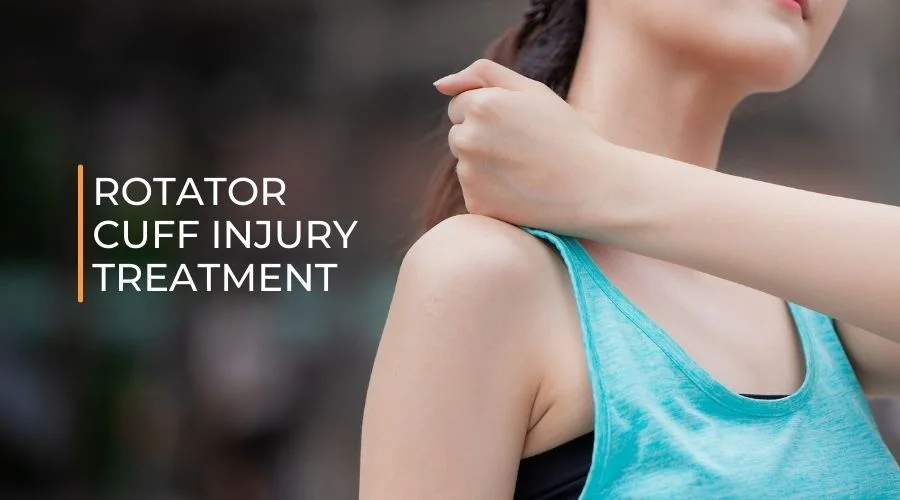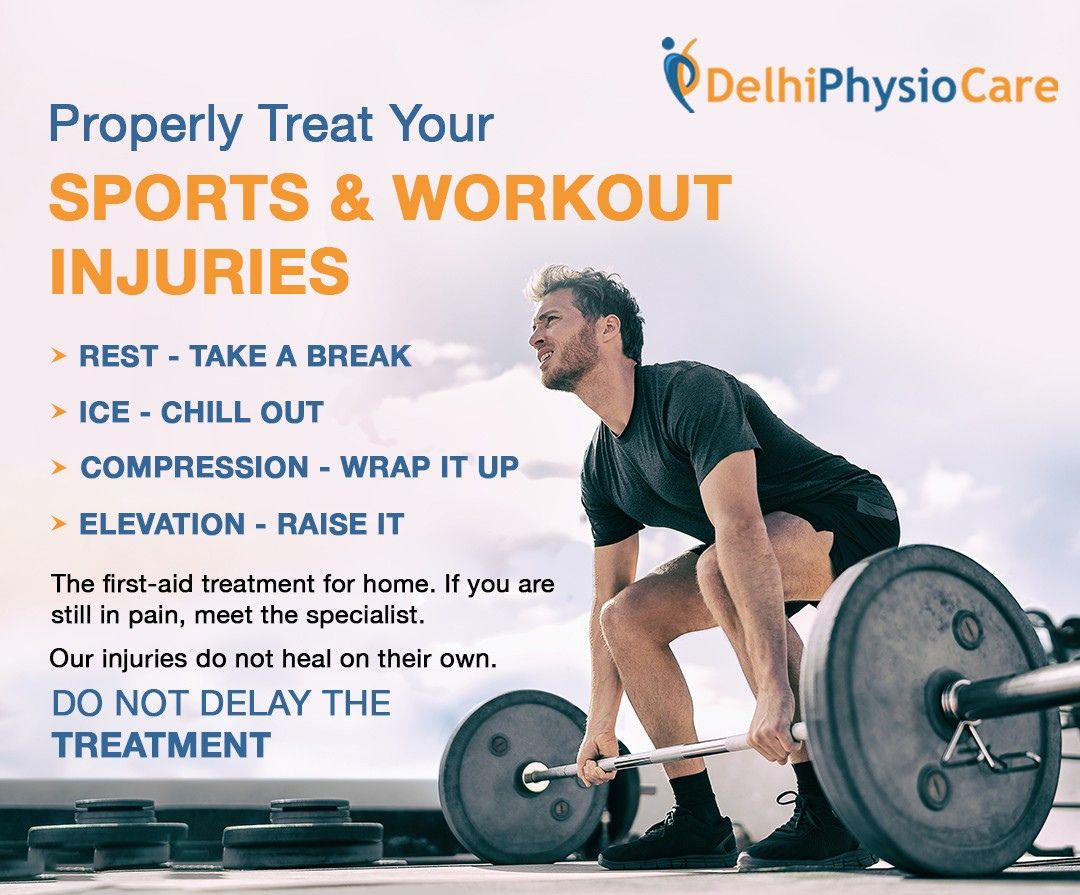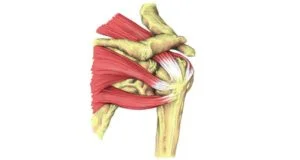Rotator Cuff Injury Treatment
Home / Rotator Cuff Injury TreatmentRotator Cuff Injury Treatment in Delhi

Rotator cuff injuries are common in athletic and non-athletic patients. If one or more of the rotator cuff tendons are damaged, the shoulder can become stiff, sore, or lose mobility. The rotator cuff cannot cause immediate pain, although it can result in acute injuries.
A rotator cuff tear is a bothersome injury that can also prevent the patient from going about their daily tasks. Two types of rotator cuff injury can occur:
- A full tear or a complete tear, in which the tendon is completely detached from the bone.
- A partial tear in which the tendon is damaged but not completely severed.

At Delhi Physio Care we often treat rotator cuff injuries without surgery, through activity modification, and physiotherapy. After an injury or surgery, our physiotherapists will help you return to your daily activities and enjoy a more active and healthier lifestyle. Our personalized and well-structured conditioning program will also help you get back to sports and other leisure activities.
Symptoms
Common symptoms of rotator cuff injury include:
- Avoiding certain activities because they cause pain;

- Difficulty reaching the full range of motion of the shoulder;
- Difficulty sleeping on the affected shoulder;
- Pain or tenderness when stretching
- Constant pain in the shoulder, especially at night
- Pain in reaching behind the back
Causes
Causes of rotator cuff injuries include:
- Falling. Using your arm to break a fall or falling on your arm can bruise or tear a rotator cuff tendon or muscle.
- Lifting or pulling. Lifting an object that’s too heavy or doing so improperly — especially overhead — can strain or tear your tendons or muscles.
- Repetitive stress. Repetitive overhead movement of your arms can stress your rotator cuff muscles and tendons, causing inflammation and eventually tearing.
- Bone spurs. An overgrowth of bone can occur on a part of the shoulder blade that protrudes over the rotator cuff. This extra bone can irritate and damage the tendon.
Risk Factors
The following factors may increase your risk of having a rotator cuff injury:
- Age. As you get older, your risk of a rotator cuff injury increases. Rotator cuff tears are most common in people older than 40.
Certain sports. Athletes who regularly use repetitive arm motions, such as baseball pitchers, archers and tennis players, have a greater risk of having a rotator cuff injury. - Construction jobs. Occupations such as carpentry or house painting require repetitive arm motions, often overhead, that can damage the rotator cuff over time.
Complications
Although resting your shoulder is necessary for your recovery, keeping your shoulder immobilized can cause the connective tissue enclosing the joint to become thickened and tight (frozen shoulder).
Prevention
If you are at risk of rotator cuff injuries or if you’ve had a rotator cuff injury in the past, daily shoulder stretches and exercises can help prevent future injury.
Most people exercise the front muscles of the chest, shoulder and upper arm, but it is equally important to strengthen the muscles in the back of the shoulder and around the shoulder blade to optimize shoulder muscle balance. Your doctor or a physical therapist can help you plan an exercise routine.
Physiotherapy
There are four muscles constituting the rotator cuff;
- SUPRASPINATUS
- INFRASPINATUS
- SUBSCAPULARIS
- TERES MINOR
These stabilize the shoulder joint and also supports the joint during abduction, shoulder elevation and rotation.
Type and size of the injury will decide whether or not you require a surgical intervention. 8 out of 10 people with rotator cuff injuries get alright without surgery. Generally the injury involves a partial tear that doesn’t involve all muscles. If it is a full thickness tear then a surgical repair is needed. In that case, hysiotherapy is needed for a post surgical rehabilitation focusing on strengthening of the muscles.
But in this article, we will talk about when the patient comes to us with a shoulder injury. We are a team of qualified and skilled therapists at Delhi Physio Care who will do a thorough assessment. This mainly concerns the nature of history of injury, area of pain, and painful movements.
Following symptoms are evaluated on examination;
- Any tenderness around the shoulder joint?
- Any referred pain in the arm or neck? Sudden jerky movements are very painful.
- Which shoulder movements are restricted? We mostly observe that active range of movement is lost but the passive is maintained.
- Is the night pain positive? If yes, then teaching the right way to position the arm is done. Also, it is important that you don’t sleep on the affected side.
- Any weakness in the joint and arm?
- Any swelling or redness?
It is important to get treated for these injuries. They will never get alright on their own and if left untreated will always worsen.
Physiotherapist main goals will be to reduce pain and work on the joint movement range and eventually restore strength. A very known complication if the joint is not mobilized is frozen shoulder. Various techniques like glides, manual soft tissue stretches, and strengthening exercises are done to improve the range, strength and flexibility.
Once the movement and strength starts improving, pain gets better. Different pain relieving modalities like US, TENS, EMS, laser therapy, hot\cold packs can be used in combination.
You need to be patient in the recovery phase. It can take anywhere between 3-8 weeks. Rotator cuff injuries are sports injuries where soft tissues and tendons get involved. So it will take a while to recover.
Follow the instructions given to you by your therapist. Be regular with your physiotherapy sessions.
Religiously follow the home exercise programme.
Avoid the movements that are painful. If you were able to do a certain exercise some days back, it doesn’t mean that you can do it forever. Listen to the signs your body gives. Certain movements that need to be avoided are shoulder abduction beyond 90 degrees, heavy weight lifting and overhead activities.
Your therapist will explain what to expect from the treatment and the time of recovery.
QUICK ENQUIRY
Send us a message with your contact details and one of our staff will contact you right away.
TREATMENTS
BOOK AN APPOINTMENT
GENERAL ENQUIRIES
235, Avtar Enclave,Paschim Vihar,Delhi – 110063
Rotator cuff injury Treatment FAQ’s
Rotator cuff injury occurs when the rotator cuff that holds the head of the upper arm bone(humerus) and the shoulder blade(scapula) is damaged.
The most common types of rotator cuff injuries are tendinitis (shoulder impingement syndrome), bursitis (pain in bursae that serves as cushions in joints), and tears (acute tears or chronic tears).
If you find it difficult to perform overhead activities or weight lifting or discomfort in the shoulder at night, we suggest a diagnosis for rotator cuff tear.
Physiotherapy cannot heal a damaged rotator cuff tendon but it helps in strengthening the shoulder muscles and movement. This helps in the overall recovery of the damaged tendons and reduces the pain and swelling in the shoulder region.
With the help of medications and physical therapy, rotator cuff tendinitis without tear can heal in four to six months.
The five best exercises suggested by the experts for rotator cuff injury are –
- Pendulum swing.
- Crossover arm stretch
- Standing row
- Internal rotation
- Posterior stretch
Rotator cuff physiotherapy involves a gentle range of exercises to improve your shoulder and hand motion. Once there is some improvement, Isometric exercises are introduced to the patient to further improve and strengthen the shoulder and its motion.
